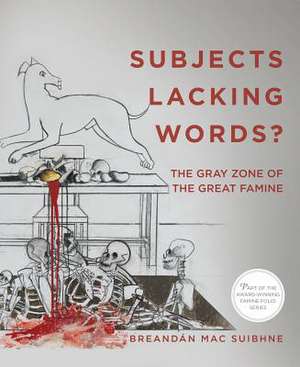Subjects Lacking Words?: Famine Folios
Autor Mac Suibhne Breandánen Limba Engleză Paperback – sep 2017
Preț: 82.70 lei
Nou
Puncte Express: 124
Preț estimativ în valută:
15.83€ • 17.19$ • 13.29£
15.83€ • 17.19$ • 13.29£
Carte disponibilă
Livrare economică 02-16 aprilie
Preluare comenzi: 021 569.72.76
Specificații
ISBN-13: 9780997837476
ISBN-10: 0997837470
Pagini: 44
Ilustrații: colour illustrations
Dimensiuni: 119 x 273 x 4 mm
Greutate: 0.25 kg
Editura: Cork University Press
Seria Famine Folios
ISBN-10: 0997837470
Pagini: 44
Ilustrații: colour illustrations
Dimensiuni: 119 x 273 x 4 mm
Greutate: 0.25 kg
Editura: Cork University Press
Seria Famine Folios
Notă biografică
Breandan Mac Suibhne is associate professor of History at Centenary University, New Jersey. Among his publications are The End of Outrage: Post-Famine Adjustment in Rural Ireland (Oxford University Press, 2017), and, as editor, with Enda Delaney, Ireland's Great Famine and Popular Politics (Routledge, 2016). Mac Suibhne is also editor of two annotated editions--John Gamble, Society and Manners in Early-Nineteenth-Century Ireland (Field Day, 2011), and, with David Dickson, Hugh Dorian, The Outer Edge of Ulster: A Memoir of Social Life in Nineteenth-Century Donegal (Lilliput, 2000; Notre Dame: University of Notre Dame Press, 2001). Some of the research on which this essay is based was made possible by a National Endowment for the Humanities Fellowship, a Franklin Grant awarded by the American Philosophical Society, and an Irish American Cultural Institute/Centre for Irish Studies Fellowship in the National University of Ireland, Galway.
Descriere
In the time of Ireland's Great Famine, poor people were, in places, so "reduced" that they treated each other with brutal callousness. Husbands abandoned wives and children.











